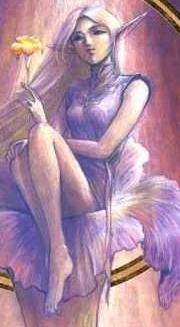Menu
Home
Deities
Morts
Clans
Race
Class
Telnet
Help
Email
Give

Races
Cent
Cyclop
Draco
Dryad
Dwarf
Elf
Fiend
Giant
Gno
Goblin
Half
Hum
Illythid
Lizard
Pixie
Shad
Troll

Menu
Home
Deities
Morts
Clans
Race
Class
Telnet
Help
Email
Give

Races
Cent
Cyclop
Draco
Dryad
Dwarf
Elf
Fiend
Giant
Gno
Goblin
Half
Hum
Illythid
Lizard
Pixie
Shad
Troll

Races
Cent
Cyclop
Draco
Dryad
Dwarf
Elf
Fiend
Giant
Gno
Goblin
Half
Hum
Illythid
Lizard
Pixie
Shad
Troll

|
|
More on Elves

 None are truly certain from whence the first elves
arose but they along with the Dwarfs were here
long before the Human colony ships arrived
several millenia ago. Elves have adapted to life in
nearly every environment possible. The mountains,
the forests, the plains, the waters, and the
underground all know the taste of elves. The
snowy wastes have felt the light touch of elven
boots, as have the hot sands of deserts. The elves'
curiosity about life makes it only natural that they
expanded their holdings to such an extent. They
wish to be sure of their world, and they cannot
understand it if they cannot experience it. If an
elf accurately reports her experiences, other elves
can understand that world intuitively. Yet elves
are notorious for their desire to see things for themselves. Even when a
place has been experienced and reported, many elves will still have a
wish to see the place. Along the journey, they are likely to view each
passing locale with great interest, stopping to explore anything that
catches their interest. For this reason, the elf race as a whole is likely to
have heard of any given location on any of the worlds they inhabit.
None are truly certain from whence the first elves
arose but they along with the Dwarfs were here
long before the Human colony ships arrived
several millenia ago. Elves have adapted to life in
nearly every environment possible. The mountains,
the forests, the plains, the waters, and the
underground all know the taste of elves. The
snowy wastes have felt the light touch of elven
boots, as have the hot sands of deserts. The elves'
curiosity about life makes it only natural that they
expanded their holdings to such an extent. They
wish to be sure of their world, and they cannot
understand it if they cannot experience it. If an
elf accurately reports her experiences, other elves
can understand that world intuitively. Yet elves
are notorious for their desire to see things for themselves. Even when a
place has been experienced and reported, many elves will still have a
wish to see the place. Along the journey, they are likely to view each
passing locale with great interest, stopping to explore anything that
catches their interest. For this reason, the elf race as a whole is likely to
have heard of any given location on any of the worlds they inhabit.
High elves are at once the most noble and most reclusive of the elves.
They act much like human knights supercilious and condescending,
full of their own importance. They think nothing of speaking their
minds, provided that this remains within the bounds of elven decorum.
They are often haughty, disdaining contact with most others, including
all other elves. Taller and more slender than the other elves, they
typically have silver hair and amber eyes. While not exactly bigoted
toward other races, the High elves do believe in the purity of the elven
line. They are the least tolerant of other races, and they take pains to
ensure that they remain secluded from all sometimes even other elves.
Only the mightiest mages of other races are allowed within their
mountain citadels, and these are greeted with suspicion. The High
elves are not rabid in their dislike of the shorter lived races, but they
do fear the corruption that the other races can bring to the elves.
Because of their reverence for the sanctity of elven blood, High elves
have striven to maintain their original ideals. They consider themselves
to be the purest form of all elves. They believe that, since the other
elves do not concern themselves with maintaining their purity, their
role in the elven world is less than that of the High elf. These elves feel
that they are the true elves and that others are somehow lesser versions.
Their entire existence is based on developing and discovering new
knowledge, and they therefore spend less time on the pleasurable
pursuits that occupy other elves' lives. Their mages are without peer
in the elven world. Even mages of greater power from other races
speak of the knowledge of the High elves with no small measure of
fascination. Their long lifespans ensure that they are among the most
knowledgeable mages on any world, though not necessarily the most
powerful.
It is a guarantee that almost any High elven work can hold the
strongest magicks and enchantments. The very qualities of the
manufacture work subtle charms into the item, making it more
receptive to whatever potent magic a mage might use to enhance it.
They have produced most of the magical items attributed to elvenkind
and are particularly devoted to the creation of tomes and scrolls. High
elves often have the most extensive libraries of anyone in the world.
Any community of more than 50 years will have a communal library
rivaling those of any major city or wizard. Such libraries are open to all
elves who wish to better themselves and increase their knowledge. Since
they value the constant expansion of their stores of books, many spend
their lives in research (either magical or scientific), writing learned
treatises. High elf society is among the most rigidly defined in any world.
They are ruled by a hereditary monarch, either male or female, who can
be succeeded by any of the other members of the House Royal. This is
subject to approval by a majority of the House Noble. The ruler must
have all decisions ratified by such a majority.
Wood elves are descended from the same stock as the other elves but
are far more primitive than their kin. Their lives are geared toward the
simple matter of survival in the woodlands, rather than enjoyment. Not
for them the sophistication of art and delicate music. They prefer a
simpler life. Their music is that of wind through leaves, the howl of
wolves, and the cries of birds. Their art in the form of tattoos is inspired
by the everchanging cycle of seasons. Wood elves, by their very nature,
seem more prone to violence than their civilized cousins. Their muscles
are larger, their complexions more florid. Wood elf clothing is much less
gaudy than one would normally expect from an elf. The focus of their
clothing is to allow the wearer to blend with the woods easily. A typical
outfit is dark brown and green, or tan and russet in fall. Winter finds
sylvan elves wearing white leather so that they can hide in snow. Wood
elves are often described as wild and temperamental. This is true to the
extent that these elves are a very emotional people. They live with their
hearts, not their minds as do the High elves. Whatever they feel, they
know it is the right answer. Logic plays little part in their lives, for logic
cannot save one from the charging boar or the falling tree. Intuition
and strength are all that counts in the wildwood.
The most commonly seen of all elves, the Wood elves are also the most
open and friendly. They have no compunction about traveling in the
world outside their lands, and they do so much more often than other
elves. Wood elves know the value of friendship and alliance with the
other good races of the world. However, they are not always easily
befriended. Many Wood elves are cautious about trusting the shorter
lived races, quite a few learned to distrust humans and dwarves in their
younger days.
Elven homes are enchanted, the lands under their jurisdiction places
of goodness. The realms of Wood elves are fabled in the lands of men,
and the highest aspiration of many a human is to slip into the arms of
death while basking in the serenity of the elf lands. These elves do not
place a great deal of value on society, preferring instead to live as they
wish rather than how someone tells them to. Their villages are peaceful
places, for the elves all look out for one another. They have a royal
bloodline of sorts, but few elves pay it much heed. They do not respect
someone purely on the basis of birth. They live in a constant
relationship with nature, never taking more than they need and giving
back ever more. They replenish the forests and the plains constantly,
ensuring that there will always be nature within their world. As such,
they are often regarded by other good-aligned races as the highest
epitome of goodness. Although those who prefer law over freedom do
not always agree, they nearly always have respect for the quality of
elven life. There is no doubt that the high elves lead a fine life:
Freedom, nature, and the sheer vitality of being alive comprise the
daily existence of a high elf.
These elves have few cares or worries, and their lives are often
characterized by idyllic splendor. While they face problems from
rampaging humanoids or the encroachment of humans, they seem
to live free of the cares that so often plague other elves. Because they
live so closely in harmony with nature, they have little trouble finding
sustenance in the areas near their homes. Game proliferates near high
elf communities, and the earth is fertile for them. However, should the
high elves roam farther afield, they often discover a different matter
entirely. A band of elves on the march must sometimes rely upon the
generosity of others.
|
|
|
|







